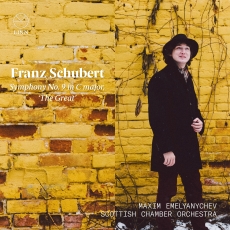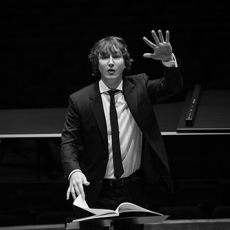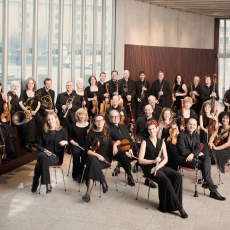Maxim Emelyanychev & SCO - Schubert: Symphony No. 9 - MusicWeb International
Until recently, lots of record buyers had heard Maxim Emelyanychev without having heard of him: he played the continuo for Teodor Currentzis’ Mozart opera recordings in Perm, which gives an insight into not only his musical brilliance but also his willingness to challenge orthodoxies. He made his debut conducting the Scottish Chamber Orchestra as a late replacement in Edinburgh in 2018, and it was an absolute cracker. I was in the hall that night, and they generated the most exciting Schubert Great I’ve ever heard in a concert hall. Clearly I wasn’t the only person who felt that way, because within weeks the orchestra had offered him the Principal Conductorship, a post which, as I write, he has only just taken up.
As a teaser, just before the SCO announced their new season earlier in 2019, they got together in the studio to record that symphony, and that’s what comes to us now. You could argue that it was a brave move for this tem to release their first recording before Emelyanychev had even taken up the job, but it was worth the gamble. This disc is a hit: it reminds me of the excitement of that first concert while also paving the way for new things to come, but it also stands alone as the finest Schubert Great we have had in recent years, for my money the best since Abbado’s recording with Orchestra Mozart.
Astonishingly, Emelyanychev already seems to understand how the orchestra works. The sound picture he creates for the symphony is utterly in keeping with what the SCO does best with natural brass (announced with wonderfully unadorned beauty in the opening horn call) and timps, but modern strings played with little vibrato. The orchestra clearly trust him, and they respond by following every one of his directions that might, in some hands, be seen as an eccentricity. It’s as though they’ve already become a symbiotic partnership, which is incredible when you consider that this was only their third meeting.
Take speeds, for example. The ma non troppo marking of the first movement is pretty much ignored - this is a proper Allegro! - but it works, and part of the reason for that is laid down in the slow introduction. It’s a definite Andante, in other words a “walking pace”, clean and reflective, not slow; but it’s also enormously purposeful and, importantly, it carries a tremendous sense of expectation for what’s about to come. At the three-minute mark the sense of tightening tension is tremendous, and it spills over into an Allegro that is excitingly fast but not breathless. Critically, there is also a terrific sense of pace and of an entity coalescing before you, like a metamorphosis that you’re privileged to be able to watch.
The sense of momentum then continues through an architectural development into a recapitulation that is both exciting and gently knowing, Emelyanychev prolonging the pianissimo for much longer than many of his competitors would dare. The ebb and flow of the second subject leads into a helterskelter coda - the fastest thing in the movement - whose recap of the opening fanfare isn’t that much slower, meaning there is no artificial spotlighting of the theme, merely a sense of joy at a goal achieved.
It’s electrifying and, in a similar vein, the second movement is a proper con moto rather than a slow movement per se. However, where some play this movement as a tortured descendant of the Allegretto of Beethoven’s Seventh Symphony, Emelyanychev takes it like a May morning stroll. There is lightness, excitement and a sense of enjoying the surroundings. However, the climactic breakdown of the middle comes as a definite interruption, and while some sort of order is restored in the second half there is an inescapable shadow, as though the music has been altered by the encounter.
The Scherzo is wonderfully light, and the bustle of the strings is matched by a delightful gurgle in the winds. Then the central Trio section has a marvellous sense of legato, impelled forwards with a gentle sense of inevitability that gives it the feel of a Ländler, simultaneously unassuming yet magisterial. There’s also a wonderful sense of drive to the finale, an electric vivace energy that has a thrust and power all of its own, moving with crackling semiquavers and a spiralling sense of momentum. It carries all before it in its own wave of energy, and then the unison string chords of the coda sound like the footsteps of a giant, each one answered by a cackle of delight from the brass.
That sets the seal on a tremendous performance which, to be fair, is not just about Emelyanychev. To an extent, I focus on him because you take the excellence of the orchestra as read, and you’re right to do so. Strings are warm and purposeful throughout, and winds play like they’re singing. There are dozens of standout moments but, to highlight a couple, listen to the trombones played with aristocratic majesty in the first movement’s exposition, or the lithe cellos that restore order after the climactic breakdown in the centre of the second movement.
The Linn recording is of demonstration standard, helped by the wonderful acoustic of Dundee’s Caird Hall. Listen, for example, to the discrete trumpet fanfares in the middle of the second movement, which are noticeable without being insistent, placed at just the right distance and level of atmosphere; or how they capture the slightly dry, quiet timpani rolls that prepare the way for the finale’s recapitulation.
Yes: this is a conductor/orchestra partnership that we’re going to be paying a lot of attention to in the coming years, and I for one can’t wait. You might argue that less than 55 minutes is rather short shrift for a CD, but it’s worth every penny, and if this had come my way sooner then it would have been one of my discs of 2019.
When Michael Cookson reviewed Abbado’s 2011 performance, he said “I do not think Schubert’s Ninth has ever been more beautifully played and recorded than on this gold standard Deutsche Grammophon release.” Now it has. Take a bow, everyone involved, while the rest of us get excited about what’s to come next.


